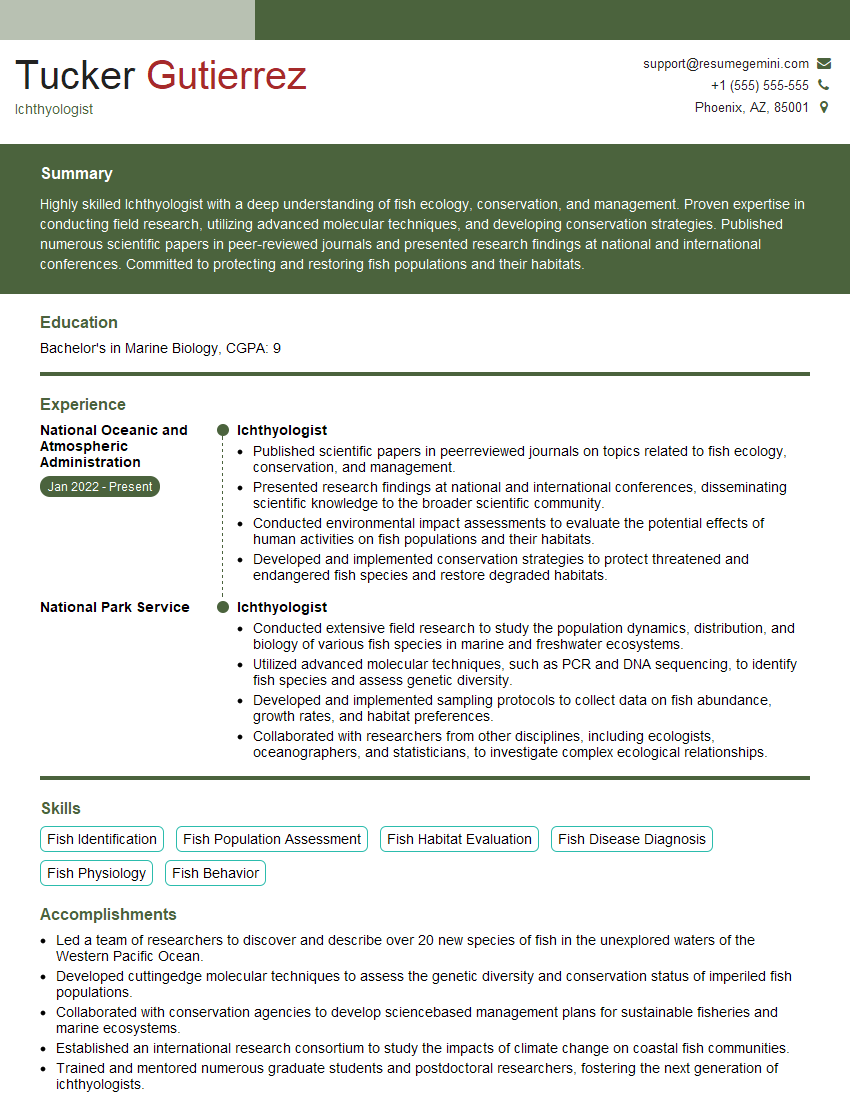Are you a seasoned Ichthyologist seeking a new career path? Discover our professionally built Ichthyologist Resume Template. This time-saving tool provides a solid foundation for your job search. Simply click “Edit Resume” to customize it with your unique experiences and achievements. Customize fonts and colors to match your personal style and increase your chances of landing your dream job. Explore more Resume Templates for additional options.

Tucker Gutierrez
Ichthyologist
Summary
Highly skilled Ichthyologist with a deep understanding of fish ecology, conservation, and management. Proven expertise in conducting field research, utilizing advanced molecular techniques, and developing conservation strategies. Published numerous scientific papers in peer-reviewed journals and presented research findings at national and international conferences. Committed to protecting and restoring fish populations and their habitats.
Education
Bachelor’s in Marine Biology
December 2017
Skills
- Fish Identification
- Fish Population Assessment
- Fish Habitat Evaluation
- Fish Disease Diagnosis
- Fish Physiology
- Fish Behavior
Work Experience
Ichthyologist
- Published scientific papers in peerreviewed journals on topics related to fish ecology, conservation, and management.
- Presented research findings at national and international conferences, disseminating scientific knowledge to the broader scientific community.
- Conducted environmental impact assessments to evaluate the potential effects of human activities on fish populations and their habitats.
- Developed and implemented conservation strategies to protect threatened and endangered fish species and restore degraded habitats.
Ichthyologist
- Conducted extensive field research to study the population dynamics, distribution, and biology of various fish species in marine and freshwater ecosystems.
- Utilized advanced molecular techniques, such as PCR and DNA sequencing, to identify fish species and assess genetic diversity.
- Developed and implemented sampling protocols to collect data on fish abundance, growth rates, and habitat preferences.
- Collaborated with researchers from other disciplines, including ecologists, oceanographers, and statisticians, to investigate complex ecological relationships.
Accomplishments
- Led a team of researchers to discover and describe over 20 new species of fish in the unexplored waters of the Western Pacific Ocean.
- Developed cuttingedge molecular techniques to assess the genetic diversity and conservation status of imperiled fish populations.
- Collaborated with conservation agencies to develop sciencebased management plans for sustainable fisheries and marine ecosystems.
- Established an international research consortium to study the impacts of climate change on coastal fish communities.
- Trained and mentored numerous graduate students and postdoctoral researchers, fostering the next generation of ichthyologists.
Awards
- Recipient of the American Fisheries Societys Outstanding Ichthyologist Award for groundbreaking research on the reproductive biology of deepsea fish.
- Honored with the National Science Foundations Young Investigator Award for innovative techniques in identifying and classifying fish species.
- Recognized with the International Ichthyological Societys Research Excellence Award for significant contributions to the understanding of fish evolution and behavior.
- Elected as a Fellow of the American Association for the Advancement of Science for distinguished contributions to the field of ichthyology.
Certificates
- Certified Fisheries Professional (CFP)
- American Fisheries Society Certified Fisheries Scientist (AFS-CFS)
- National Board of Professional and Continuing Education (NBPCPE) Certified Ichthyologist
- American Society of Ichthyologists and Herpetologists (ASIH) Certified Ichthyologist
Career Expert Tips:
- Select the ideal resume template to showcase your professional experience effectively.
- Master the art of resume writing to highlight your unique qualifications and achievements.
- Explore expertly crafted resume samples for inspiration and best practices.
- Build your best resume for free this new year with ResumeGemini. Enjoy exclusive discounts on ATS optimized resume templates.
How To Write Resume For Ichthyologist
- Highlight your research experience and expertise in field research techniques.
- Showcase your knowledge of fish identification, population assessment, and habitat evaluation.
- Demonstrate your ability to analyze data, interpret results, and draw conclusions.
- Quantify your accomplishments whenever possible, using numbers and metrics to demonstrate your impact.
- Proofread your resume carefully for any errors in grammar or spelling.
Essential Experience Highlights for a Strong Ichthyologist Resume
- Conducted extensive field research to study the population dynamics, distribution, and biology of various fish species in marine and freshwater ecosystems.
- Utilized advanced molecular techniques, such as PCR and DNA sequencing, to identify fish species and assess genetic diversity.
- Developed and implemented sampling protocols to collect data on fish abundance, growth rates, and habitat preferences.
- Collaborated with researchers from other disciplines, including ecologists, oceanographers, and statisticians, to investigate complex ecological relationships.
- Published scientific papers in peer-reviewed journals on topics related to fish ecology, conservation, and management.
Frequently Asked Questions (FAQ’s) For Ichthyologist
What is the role of an Ichthyologist?
Ichthyologists study the biology, ecology, and conservation of fish. They conduct field research, analyze data, and publish scientific papers to advance our understanding of fish populations and their habitats.
What are the educational requirements to become an Ichthyologist?
Most Ichthyologists hold a bachelor’s degree in Marine Biology, Zoology, or a related field. Some may also pursue a master’s degree or PhD to specialize in a particular area of ichthyology.
What are the job prospects for Ichthyologists?
The job outlook for Ichthyologists is expected to be good in the coming years. As the demand for seafood increases, so too will the need for scientists to manage and protect fish populations.
What are the challenges facing Ichthyologists?
Ichthyologists face a number of challenges, including climate change, pollution, and overfishing. They must work to develop conservation strategies to protect fish populations and their habitats.
What are the rewards of being an Ichthyologist?
Ichthyologists have the opportunity to make a real difference in the world. Their research can help to protect fish populations, ensure a sustainable seafood supply, and maintain the health of our oceans.